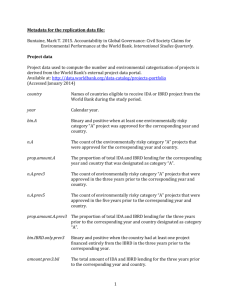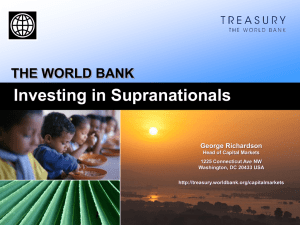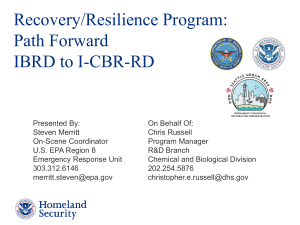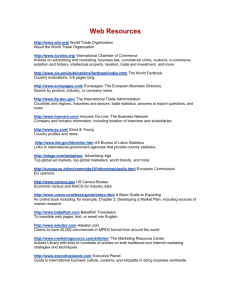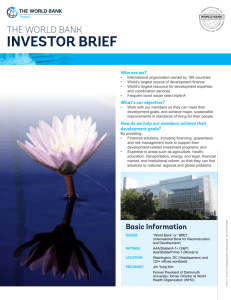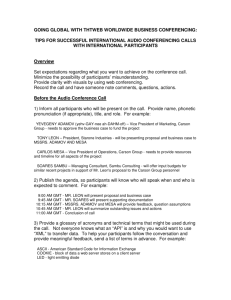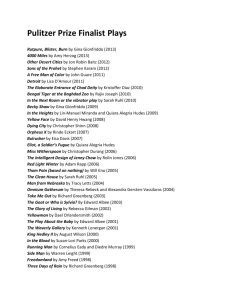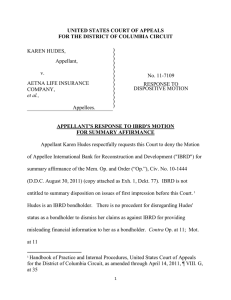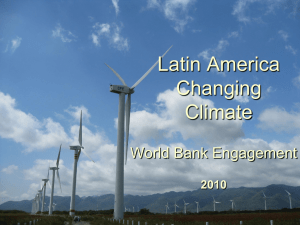appellant's response to ibrd's motion for summary
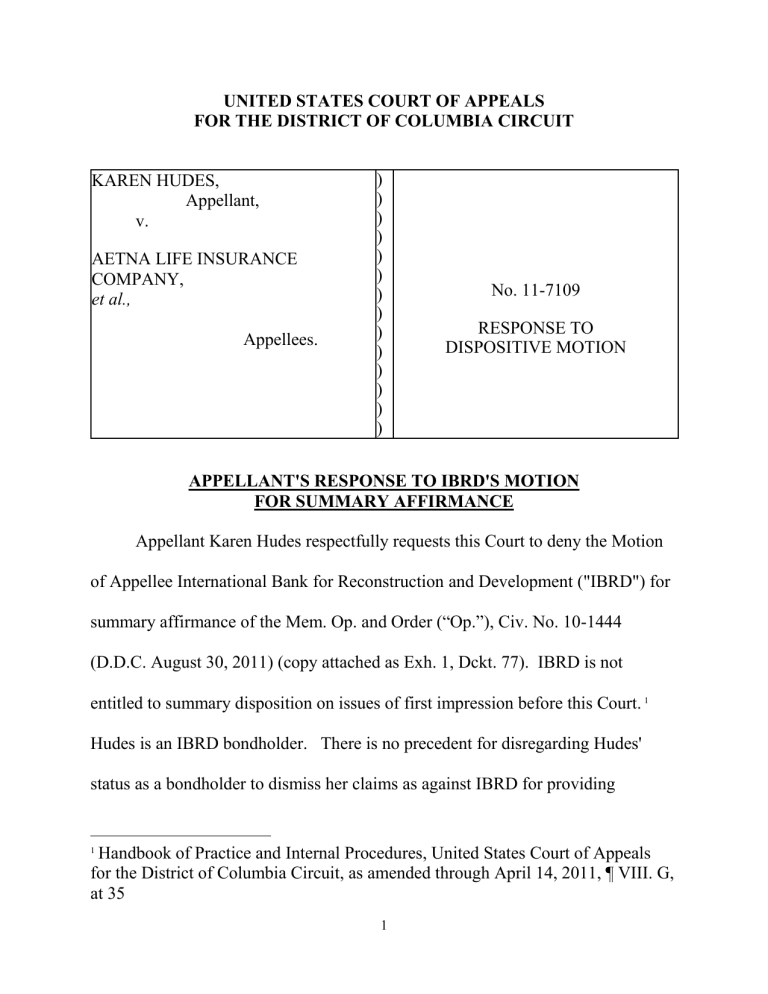
UNITED STATES COURT OF APPEALS
FOR THE DISTRICT OF COLUMBIA CIRCUIT
KAREN HUDES,
Appellant, ) v.
)
)
AETNA LIFE INSURANCE
)
COMPANY,
) et al.,
)
)
RESPONSE TO
Appellees.
)
No. 11-7109
)
DISPOSITIVE MOTION
)
)
)
)
APPELLANT'S RESPONSE TO IBRD'S MOTION
FOR SUMMARY AFFIRMANCE
Appellant Karen Hudes respectfully requests this Court to deny the Motion of Appellee International Bank for Reconstruction and Development ("IBRD") for summary affirmance of the Mem. Op. and Order (“Op.”), Civ. No. 10-1444
(D.D.C. August 30, 2011) (copy attached as Exh. 1, Dckt. 77). IBRD is not entitled to summary disposition on issues of first impression before this Court.
1
Hudes is an IBRD bondholder. There is no precedent for disregarding Hudes' status as a bondholder to dismiss her claims as against IBRD for providing
1 Handbook of Practice and Internal Procedures, United States Court of Appeals for the District of Columbia Circuit, as amended through April 14, 2011, ¶ VIII. G, at 35
1
misleading financial information to her as a bondholder. Contra Op. at 11; Mot. at 11
IBRD is subject to oversight by its Board of Executive Directors, Board of
Governors, and its regulators, including the Securities and Exchange Commission, the Public Company Accounting Oversight Board, the National Advisory Council for International Monetary and Financial Policies, and the agencies responsible for enforcement of the blue sky laws in the fifty states whose citizens hold IBRD's
$110 billion in bonds. IBRD's oversight agencies and regulators agree that IBRD is not in compliance.
2
Hudes, as IBRD's legal officer, "acted in the public interest and for the protection of investors" in fulfilling her obligations under Sarbanes-Oxley§307.
3
(Op. at 9) See Exh. 3, Chronology of Internal Control Lapses at the World Bank, briefing paper prepared for Hudes' May 25, 2011 testimony to the European
2 Government Accountability Office, "World Bank Group: Important Steps Taken on Internal Control but Additional Assessments Should Be Made," June 16, 2003.
Available at: http://www.gao.gov/products/GAO-03-366
April 8, 2005 letter from the Joint Economic Committee of the US Congress to Mr.
James Wolfensohn: "[t]he Joint Economic Committee has received credible evidence indicating that the World Bank has experienced accounting problems involving its borrowing, investment, and lending activities." Exh. 2, Dckt 24-6 at 1.
3 Sarbanes-Oxley Act of 2002, Pub. L. 107-204, 116 Stat. 745 (2002), codified in relevant part at 18 U.S.C. §1514A
2
Parliament.) 4 In a letter of June 1, 2011, Mr. Luigi de Magistris, the Chair of the
European Parliament's Committee on Budgetary Control, wrote Hudes, "I share the opinion expressed by the Members of the Committee that it was very interesting and inspiring to learn about your case at the World Bank." See Exh. 4
The legislative history of IBRD's access to the US capital market and
Sarbanes-Oxley 5 make it clear that IBRD's temporary and revocable exemption from registration statements did not convey carte blanche to IBRD to maintain deficient control over financial reporting and furnish misleading financial statements to Hudes as one of IBRD's bondholders. IBRD waived its immunity in this action concerning Hudes' right as a bondholder of IBRD to accurate financial statements.
SUMMARY OF ARGUMENT
“A party seeking summary disposition bears the heavy burden of establishing that the merits of his case are so clear that expedited action is justified.” TaxpayersWatchdog, Inc. v. Stanley , 819 F.2d 294, 297 (D.C. Cir.1987),
(internal citations, omitted). “To summarily affirm an order of the district court, this court must conclude that no benefit will be gained from further briefing and argument of the issues presented.”
Id at 298.
4 An earlier version of the chronology was appended to Appellant's January 17,
2011 Mem. in Opp. to Mot. to Dismiss, Exh. 3 Dckt. 62-2, at 11-26.
5 Sarbanes-Oxley Act of 2002, Pub. L. 107-204, 116 Stat. 745 (2002), codified in relevant part at 18 U.S.C. §1514A
3
[to be expanded]
ARGUMENT
I. IBRD REQUESTED THIS COURT TO DISREGARD THE
DISTRICT COURT'S GROUNDS FOR DISMISSAL
IBRD has no immunity to report misleading financial information to IBRD's oversight agencies and bondholders.
A. Statement of the Case
Lucio Tan, a crony of Joseph Estrada, then President of the Philippines, acquired stock owned by government employees in Philippines National Bank
(“PNB”) valued more than 10% of PNB's outstanding capital without disclosure, as required by Philippines securities laws. Tan owned Philippines Airlines, in default on its loans from PNB. The government of the Philippines loaned $493 million to
PNB after PNB's depositors made heavy withdrawals. $200 million of a loan from
IBRD and similar amounts of Japanese cofinancing were cancelled. Estrada was ultimately impeached, and in 2007 an anti-corruption court in the Philippines required Estrada to refund graft he had plundered. IBRD's Country Director in the
Philippines reassigned Hudes when she asked him to sign a letter warning the
Philippines' government that IBRD could not disburse its loan without a waiver from the Board of Executive Directors since the loan conditionality was not met.
IBRD's Internal Audit Department refused to correct the satisfactory evaluation of the World Bank's supervision performance or the flawed report of the Institutional
4
Integrity Department to the Audit Committee of the Board of Executive Directors.
When the Audit Committee requested an audit of internal controls over financial reporting, KPMG, the external auditors, circumscribed the scope of their audit in violation of Generally Accepted Accounting Principles and Generally Accepted
Auditing Standards.
B. De Novo Review for Lack of Subject Matter Jurisdiction
Under current jurisprudence, the DC Court of Appeals is to review de novo the District Court's dismissal of Hudes' complaint for lack of subject matter jurisdiction, Trudeau v. Federal Trade Com'n , 456 F.3d 178, 183 (C.A.D.C.2006).
The DC Court of Appeals also reviews de novo dismissals for failure to state a claim. See Mwani v. Bin Laden , 417 F.3d 1, 6 (D.C.Cir.2005) .
" Under Rule 12(b)(1) the motion to dismiss stage, counseled complaints, as well as pro se complaints, are to be construed with sufficient liberality to afford all possible inferences favorable to the pleader on allegations of fact.”
Settles v. U.S.
Parole Comm'n, 429 F.3d 1098, 1106 (D.C.Cir.2005). All of IBRD's objections to jurisdiction are intertwined with the merits. "But we ensure that defendants are not allowed to use Rule 12(b)(1) to resolve the merits too early in litigation. By requiring less of a factual showing than would be required to succeed at trial, district courts ensure that they do not prematurely grant Rule 12(b)(1) to dismiss claims in which jurisdiction is intertwined with the merits and could be established,
5
along with the merits, given the benefit of discovery." CNA v. U.S
., 535 F.3d 132,
(2008).
Arbaugh v. Y & H Corp., 546 U.S. 500, 515, (2006). "This distinctionwhether a statute contains within itself the bounds of its jurisdiction-counsels the result in our case. Section 1346, by subsection (b)(1), tethers jurisdiction to meeting that subsection's requirements. Subrogees invoke the principle that
"'where the defendant's challenge to the court's jurisdiction is also a challenge to the existence of a [f]ederal cause of action, the proper course of action for the district court ... is to find that jurisdiction exists and to deal with the objection as a direct attack on the merits of the plaintiff's case.'" Cohen v. Kurtzman, 45
F.Supp.2d 423, 428-29 (D.N.J.1999) (quoting Williamson v. Tucker, 645 F.2d 404,
415 (5th Cir.1981)). This idea runs through numerous cases that classify issues as either jurisdictional or relating to the merits. See, e.g., Mortensen, 549 F.2d at 890
(contrasting antitrust claims from “other claims whose jurisdictional bases are not as intertwined with their merits”).
IBRD seeks to prevent a de novo review by requesting this Court to disregard the District Court's grounds for dismissing Hudes' case (Op. at 11 and
13). IBRD's motion for summary affirmance rests "wholly on immunity grounds."
See Mot. at 12. A question of first impression does not warrant an abbreviated disposition.
6
C. IBRD Waived Its Immunity
IBRD has waived immunity to Hudes as an IBRD bondholder. IBRD's
Articles of Agreement 6 provide in Article VII Status, Immunities and Privileges:
SECTION 3. Position of the Bank with Regard to Judicial Process
Actions may be brought against the Bank only in a court of competent jurisdiction in the territories of a member in which the Bank has an office, has appointed an agent for the purpose of accepting service or notice of process, or has issued or guaranteed securities.
In Lutcher S. A. Celulose e Papel v. Inter-American Development Bank , 382
F.2d 454 (C.A.D.C. 1967), the Inter-American Development Bank was not immune from suit in the United States District Court for the District of Columbia under an identical provision in its Articles. The Court in Lutcher determined that the waiver of immunity in Section 3 under the organizations' Articles of
Agreement took precedence over the International Organizations Immunities Act.
Lutcher also examined a similar Executive Order for the World Bank and IFC.
7
6 The United States acceded to the Articles of Agreement of the IBRD in the Bretton Woods Agreement Act, Pub.L. 79-171, 59 Stat. 512 (1945), codified at
22 U.S.C. § 286.
7 "There is another strand to the question of the Bank's immunity that bears notice.
In 1960 President Eisenhower issued, as we noted, his Executive Order qualifying the Bank for immunities available under the terms of the International
Organizations Immunities Act. In 1962 President Kennedy amended President
Eisenhower's Order by another Order, which is entitled as intended ‘to provide for an exception to the Inter-American Development Bank's immunity from suit specified in the International Organizations Immunities Act.’ This Order added the following clause to the Eisenhower Order:
7
IBRD's latest Information Statement filed with the SEC provides with respect to IBRD's legal status, privileges and immunities to bondholders:
IBRD has full juridical personality with capacity to make contracts, to acquire and dispose of property and to sue and be sued. Actions may be brought against IBRD in a court of competent jurisdiction in territories of any member in which IBRD has an office, has appointed an agent for accepting service or notice of process or has issued or guaranteed securities.
The District Court stated incorrectly that Hudes invokes IBRD's waiver of immunity for wrongful-termination and employment-discrimination claims. (Op. at
9). Hudes invokes IBRD's waiver of immunity as a bondholder of IBRD. The
District Court's decision to disregard Hudes' status as a bondholder was incorrect
Provided, That such designation shall not be construed to affect in any way the applicability of the provisions of Section 3, Article XI, of the Articles of
Agreement of the Bank. [Exec.Order No. 11019, 27 Fed.Reg. 4145 (1962).] As amended, the Order tracks the Orders qualifying the International Finance
Corporation and the World Bank. [Exec.Order No. 10680, 21 Fed.Reg. 7647
(1956); Exec.Order No. 9751, 11 Fed.Reg. 7713 (1946).] Its effect could only have been to reinforce the waiver of immunity. The Eisenhower Order qualified the Bank ‘as a public international organization entitled to enjoy the privileges, exceptions, and immunities conferred by the International Organizations
Immunities Act.’ By the terms of the Act, of course, the Bank enjoys immunity except to the extent that a waiver is shown. But the Kennedy Order removed the force of any argument that the Bank had had immunities conferred upon it by the
Act regardless of its waiver. The Kennedy Order stated its purpose to be to provide for an exception to immunity, and it did so by decreeing that the designation of the Bank as an international organization entitled to enjoy the immunities conferred by the Act ‘shall not be construed to affect in any way the applicability of the provisions of Section 3, Article XI’ of the Agreement. The only language in Section 3 concerned with exceptions to immunity is the language which we read as a waiver."
8
and warrants full briefing. (Op. at 11) [decisions where Plaintiffs had more than one classification, and both kinds of status were recognized by the court]
II. OVERSIGHT OF IBRD
A. Hudes' Action Furthers the Objectives of IBRD
After the District Court refused to recognize Hudes' status as an IBRD bondholder, the Court dismissed Hudes' case under a two-pronged test for waivers of immunity: (Op. at 10) Mendaro v. World Bank, 717 F.2d 610 (C.A.D.C. 1983),
Atkinson v. Inter-American Development Bank , 156 F. 3d 1335 (C.A.D.C. 1998)
Aguado v. Inter-American Development Bank , 85 Fed. Appx. 776 (D.C. Cir. 2004),
Broadbent v. OAS , 628 F.2d 27 (C.A.D.C. 1980) : (1) actions arising out of the
Bank's external relations with its debtors and creditors; and (2) the particular type of suit would further the Bank's objectives.
Hudes qualifies for IBRD's waiver of immunity under both prongs of the test. Mr. Pieter Stek, then Executive Director of the Netherlands constituency and
Chair of IBRD's Board Committee on Development Effectiveness, testified that the effectiveness of the IBRD in fulfilling its mandate was at stake in Hudes' case:
In a multilateral institution which should be governed by the rule of law and high standards of probity the charge of concealment from the Board of
Executive Directors of information relevant to the exercise of its duty of supervising management and the persecution of the person who brings this to light is extremely serious. If correct, which I believe, this poisonous cocktail undermines good governance and ultimately the effectiveness of the
Bank in fulfilling its mandate. I shall continue to assist Ms. Hudes in her
9
efforts to have due process brought to bear, preferably by the Bank itself, on these issues of governance.
8
IBRD's argument: "[e]ven construing [Hudes's] complaint as a challenge to the
Bank's governance procedures (for which no cause of action lies in any event), subjecting the Bank to this type of claim would not 'further [the Bank's] objectives' in any way" [cases on financial entities and importance of governance]
Hudes' action furthers the purposes and operations of IBRD through providing access of the Board of Executive Directors, regulators, other oversight agencies and bondholders to accurate financial information in IBRD's operations in compliance with IBRD's Articles of Agreement. Hudes has followed the advice of
Mr. Aaron Broches, Hudes' mentor, and IBRD's longest-serving General Counsel, about the responsibility of IBRD's Legal Department for preserving rule of law in
IBRD.
B. IBRD Board Investigation
Hudes was admonished two days after informing the Board's Audit
Committee of the cover-up and placed on probation. (Plaintiff’s April 10, 2010
Response to Aetna's Motion to Dismiss, Dckt 24-1, at 3) The Dutch Ministry of
Foreign Affairs requested IBRD's Audit Committee to look into the corporate governance problems Hudes had raised.
9 Instead, Mr. Pierre Duquesne, Chair of
8 The full text of Pieter Stek's testimony is in Exh. 5, Dckt 68-3, at 8.
9 Exh. 6 Dckt. 24-15 at 1.
10
IBRD's Audit Committee, requested an inquiry into the IBRD's Institutional
Integrity Department. Mr. Paul Volcker headed the 2007 inquiry into the
Institutional Integrity Department. The Volcker Panel was discredited after sixteen staff employed in the Institutional Integrity Department received significant damage awards in compensation for abuses of authority to intimidate them during the Volker Panel investigation.
10 The recommendations of the Volcker Panel did not address the internal control lapses Hudes reported. Mr. Paul Lachal-Roberts, a staff-member of the EU's anti-fraud agency Office Lutte Anti-Fraude on the
Volcker Panel, responded on March 29, 2008 to Hudes:
My Director General and I met with a number of European Executive
Directors of the World Bank a few weeks ago to discuss the Volcker Panel report. At the meeting there was also discussion about governance issues.
My impression was that the European Executive Directors are well apprised of all relevant issues at the Bank and no further comment by OLAF is warranted even if it was within our legal competence.
11
Hudes had emailed Mr. Lachal-Roberts:
As a lawyer familiar with the mandate of the legal department under the
Articles of Agreement in maintaining rule of law in the governance structure of the World Bank, I have thoroughly documented ... severe control lapses and impressed upon the US Congress the urgent need to restore proper governance.
10 Government Accountability Project, Bar Complaint Charges Former World
Bank Official With Ethics Violations , April 6, 2010, available at http://www.whistleblower.org/press/press-release-archive/484-bar-complaintcharges-former-world-bank-official-with-ethics-violations (Last visited
11 Exh. 7 Dckt. 32-2 at 13-14.
11
The current head of IBRD's Institutional Integrity Department, Mr. Leonard
McCarthy, has been charged with the abuse of prosecutorial discretion for political aims as head of South Africa's directorate of special operations.
12
C. Contempt of Congress
Hudes reported to Senator Richard Lugar that IBRD's evaluation department had concealed from IBRD's Board of Executive Directors "the role of the Bank's poor supervision of the Philippines Banking Sector Reform Loan in the corrupt take-over of the second largest bank in the Philippines resulting in a $500 million banking failure, cancellation of $200 million from the Bank's loan to the
Philippines, and cancellation of $200 million in cofinancing from Japan." 13
Hudes informed Senator Lugar that Mr. Eckhard Deutscher, then German
Executive Director and Dean of the Board, had concluded from the cover-up to the
Board in Hudes' case that "the World Bank Board is treated like a mushroom, kept in the dark, and covered with fertilizer." The Senate Committee on Foreign
Relations followed up with three inquiries to IBRD in the spring of 2007, but
12
Sebastien Berger, World Bank official faces possible criminal probe over Jacob
Zuma, The Telegraph, April 8, 2009, available at http://www.telegraph.co.uk/news/worldnews/africaandindianocean/southafrica/512
1985/World-Bank-official-faces-possible-criminal-probe-over-Jacob-Zuma.html last visited November 26, 2011
13 Exh. 8, Dckt. 24-7,
12
IBRD only stonewalled.
14 In contempt of Congress and relying upon tampered documentation, IBRD terminated Plaintiff on July 31, 2007.
On September 15, 2007 Hudes informed Senator Bayh, "[t]he ongoing cover-up is an indictment of the probity of US oversight at the Bank and I would encourage the Senate to request GAO to look into it." 15 On April 17, 2008
Senators Lugar, Bayh and Leahy requested GAO to investigate "internal resistance to increased transparency and accountability at the World Bank." 16 On November
4, 2008 Hudes' Congressman, Representative Chris Van Hollen, informed Hudes that he noted "that [Hudes'] claims and concerns have already been provided to the
GAO.... and to the relevant congressional committees".
17 In March 2009 GAO stated that it could not commence the inquiry into IBRD's transparency commissioned by Senators Lugar, Leahy and Bayh "because of challenges we recently faced in gaining access to World Bank officials." 18 Senator Lugar asked what was delaying the GAO review during hearings on the IBRD capital increase: 19
14 See Exh. 9, Hudes' letters dated March 21, and June 6, 2007 to Senator Lugar and
Mr. Keith Luse's letter dated June 12, 2007 to The World Bank ; Dckt. 24-8 at 3-5 and 7 .
15 Exh. 10, Dckt. 73-4.
16 Exh. 11, Dckt. 24-13. Available at http://citizenoversight.com/pdf/blwb.pdf Last visited November 26, 2011
17 Exh. 12, Dckt. 24-10 through 12 and 24-19.
18 The International Financial Institutions: A Call for Change A Report to the
Committee on Foreign Relations , United States Senate, March 10, 2010, at 24
Available at http://www.foreignpolicy.com/files/fp_uploaded_images/int_fin_inst2.pdf
13
Let me ask you, Executive Director Solomon, one additional question. A few years ago, I joined then-Senator Biden, Senator Leahy, Senator Bayh, and others in asking the Government Accountability Office to conduct a review of the World Bank regarding its ability to fight corruption and to conduct environmental assessments. But, at that time, the GAO did not receive clearance from the World Bank to commence its work. What is delaying that review and what could be done to ensure that the GAO has the ability to carry out its work in this endeavor?
During hearings of the House Appropriations Committee, Congresswoman Kay
Granger, Chair of the State and Foreign Operations Subcommittee of the House
Appropriations Committee, stated: 20
Now, this administration is requesting almost $2 billion in appropriations for capital increases and putting the U.S. taxpayer on the hook for another $40 billion in potential liabilities. Mr. Secretary, this committee never consented to these capital increases. Authorization bills are needed for each bank spelling out specific reforms and possibly withholding funds until reforms are met. I cannot support writing a blank check to these institutions. Large multi-year capital increases and other global commitments will be extremely difficult to justify without convincing evidence that taxpayer dollars will be used in a more effective and transparent manner than they have been in the past. Mr. Secretary, I can predict that this subcommittee will face very difficult choices this year. We will have to look at each request to determine what is critical to our national security. We must prioritize spending by looking at what works, what has good oversight, and what is not duplicated elsewhere.
Hudes referred to the Congresswoman Granger's statement in her Memorandum in
Reply to IBRD's Opposition to Plaintiff's Motion for Rule 11 Sanctions, Dckt. 73 at 1
19 Hearing on Banking on Reform: Capital Increase Proposals from the
Multilateral Development Banks before the S. Committee on Foreign Relations,
111th Cong. 61 (2011)
20 Opening Statement to Treasury Secretary Geithner, March 9, 2011 Available at: http://kaygranger.house.gov/index.cfm?sectionid=12&parentid=4§iontree=4,1
2&itemid=983
14
II. IBRD'S CONDITIONAL EXEMPTION FROM SECURITIES LAWS
The District Court erred in determining that "Sarbanes-Oxley's whistleblower-protection provisions do not apply to the World Bank as a matter of law." (Op. at 13) IBRD receives funding from US taxpayers and bondholders and is subject to oversight by Congress, the SEC, state and other jurisdictions' securities regulators.
21 The Senate and House of Representatives intended to protect persons against retaliation who assist in Congressional oversight of the
IBRD.
After hearings on accounting irregularities at the World Bank, including cost over-runs on the renovation of the World Bank's headquarters and over-charges to
World Bank borrowers, the US Congress required independent arbitration to protect whistleblowers.
22 IBRD did not implement the Lugar Leahy Amendment.
IBRD refused Hudes' request for external arbitration.
23
21 State securities regulators in Arizona, California, the District of Columbia,
Georgia, Iowa, Maryland, Michigan, New Mexico, New York, North Carolina,
Ohio, Oklahoma, and West Virginia contacted Hudes after she told the states' attorneys general that IBRD's financial information to bondholders was misleading. The attorneys general in North Carolina and Maryland thanked Hudes for providing information to assist them in protecting their citizens and effectively enforcing their laws. The Oklahoma Securities Commission is also involved.
Hudes also alerted the attorneys general in Maryland, the District of Columbia, and
Virginia to the loss of jobs from the governance crisis at the World Bank's
Washington headquarters.
22 Foreign Operations, Export Financing, and Related Programs Appropriations Act of 2005,119 Stat. 2172, including the Lugar Leahy Amendment, 22 U.S.C. 262o-4:
15
Securities regulators are required to ensure that IBRD's financial information to bondholders is not misleading. IBRD may not retaliate against its attorneys who correct internal control lapses or assist in lawful investigations of its oversight agencies and regulatory bodies. The employee protection provisions of Sarbanes-
Oxley repealed in part IBRD's temporary exemption from the US securities laws.
24
Hudes requested the SEC and the National Advisory Council on
International Monetary and Financial Policies, under the statutory authority accorded them pursuant to 22 U.S.C.§ 286k-2, to determine that 18 U.S.C. §
1514A was applicable to the IBRD. On May 27, 2010 Hudes sent a memorandum
"[It is the policy of the United States that each bank should](11)implement best practices in domestic laws and international conventions against corruption for whistleblower and witness disclosures and protections against retaliation for internal and lawful public disclosures by the bank's employees and others affected by such bank's operations who challenge illegality or other misconduct that could threaten the bank's mission, including: (1) best practices for legal burdens of proof;
(2) access to independent adjudicative bodies, including external arbitration based on consensus selection and shared costs; and (3) results that eliminate the effects of proven retaliation.
23 Exh. 13, Dckt. 24-20
24 George W. Bush's July 30, 2002 Statement on Signing Sarbanes-Oxley: "Given that the legislative purpose of section 1514A of title 18 of the U.S. Code, enacted by section 806 of the Act, is to protect against company retaliation for lawful cooperation with investigations and not to define the scope of investigative authority or to grant new investigative authority, the executive branch shall construe section 1514A(a)(1)(B) as referring to investigations authorized by the rules of the Senate or the House of Representatives and conducted for a proper legislative purpose." available at: http://www.presidency.ucsb.edu/ws/index.php?pid=64514
16
to the Chairman of the SEC and National Advisory Council on International
Monetary and Financial Policies:
The Senate and House of Representatives intended to protect persons who assist the legislature in oversight of the International Bank for
Reconstruction and Development against retaliation, and the employee protection provisions of Title VIII of the Sarbanes-Oxley Act of 2002,
Section 806, repealed in part IBRD's conditional exemption from the US securities laws.
25
The SEC acknowledged receipt of Hudes' memorandum to the Chairman of the
SEC in a letter dated July 21, 2010 from the Assistant Director of Enforcement
Matters.
26
On September 1, 2010 Hudes sent a second Memorandum to the SEC and
National Advisory Council on International Monetary and Financial Policies concerning Hudes' cause of action as a bondholder against KPMG for failure to observe applicable accounting standards.
In response to ongoing internal control deficiencies at the IBRD, on
February 27, 2009 the Chairman of IBRD's Audit Committee informed
Karen Hudes that the Audit Committee would require an external audit of
IBRD's internal control over financial reporting. The Audit Committee duly appointed KPMG to carry out such audit. KPMG's failure to comply with
Public Company Accounting Oversight Board's Auditing Standard No. 5 in conducting such audit constitutes a violation of Section 11 of the Securities
Act, 15 U.S.C. §77(k)(a)(4).
27
25 Exh. 14, Dckt.# 33-2, at 1.
26 Exh. 15, Dckt. #38-2.
27 Exh. 16, Dckt. 62-2.
17
On September 28, 2010 Hudes met with the U.K. Serious Fraud Office, and on October 12, 2010 the Serious Fraud Office called Mr. Arrevalo, Assistant
Director of the SEC's Office of International Affairs, to inquire about the IBRD's compliance on the capital market.
28 On February 14, 2011 Hudes asked the IBRD's
Board of Governors whether the IBRD may retaliate against persons who inform the Board of Governors of the World Bank's compliance issues.
29 Hudes submitted testimony to the International Development Committee in the U.K.'s House of
Commons on the effectiveness of U.K.'s multilateral aid program.
B. Question of Fact Whether SEC Revoked IBRD's Exemption
The District Court found that Sarbanes-Oxley's whistleblower-protection provisions do not apply to the World Bank. (Op. at 13). It is a question of fact and not law whether the SEC and the National Advisory Council on International
Monetary and Financial Policies rescinded IBRD's conditional exemption under the securities laws in response to Hudes' disclosures of IBRD's internal control lapses, misleading financial information, and contempt of Congress. The SEC and the National Advisory Council possess authority under the Bretton Woods
Agreement Act to rescind IBRD's exemptions at any time.
30
28 Plaintiff’s Mem. in Op. to Mot. to Dismiss Dckt. 62-1 at 20.
29 Exh. 17, Dckt. 67-5.
30 "The Securities and Exchange Commission acting in consultation with the
National Advisory Council on International Monetary and Financial Problems is authorized to suspend the provisions of section 286k-1(a) of this title at any time as
18
C. History of IBRD's Exemptions under Securities Act of 1933 and
Securities Exchange Act of 1934
IBRD's conditional exemption was granted for historical reasons that are no longer applicable. IBRD is the only organization that has been exempted from the
Securities Exchange Act of 1934 that is not a municipal or government entity. The
SEC is prohibited from imposing disclosure rules on municipal and government entities for reasons of federal-state comity. In a 1947 letter to the SEC, the IBRD wrote, "The Bank is not opposed to registering its securities under the Securities
Act of 1933 and giving to the public all the information called for by that Act.
31
IBRD's exemption in 1949 from the Securities Exchange Act of 1934 was to permit member banks of the Federal Reserve System to deal in securities issued by to any or all securities issued or guaranteed by the Bank during the period of such suspension." 22 U.S.C.§ 286k-2. 63 Stat. 299. 22 U.S.C. § 286k-1(a) provides:
"Any securities issued by International Bank for Reconstruction and Development
...shall be deemed to be exempted securities within the meaning of paragraph (a)(2) of section 3 of the [Securities Act of 1933] and paragraph (a)(12) of section 3 of the [Exchange Act of 1934]." Functions of the National Advisory Council on
International Monetary and Financial Problems were delegated to the National
Advisory Council on International Monetary and Financial Policies, see section
2(a) of Ex. Ord. No. 11269, Feb. 14, 1966, 31 F.R. 2813, set out as a note under
22 U.S.C. §286b.
31 See Letter to the SEC dated June 18, 1947 from John J. McCloy, President of the
IBRD, Exh. 18 Dckt. 24-16 Available at: http://c0403731.cdn.cloudfiles.rackspacecloud.com/collection/papers/1940/1947_0
618_McCloySECT.pdf Last visited November 28, 2011
19
IBRD.
32
IBRD argues that it is irrelevant whether the IBRD's exemption from
Sarbanes-Oxley whistleblower provisions was revoked because the SEC was not able as a matter of law to suspend the provisions of section 286k-1(a) with retroactive effect. (Mot. at 13) Jurisdictional statutes do not result in retroactive legislation since they speak to the power of the court, rather than to rights or obligations. Republic Nat. Bank of Miami, 506 U.S.80, at 100. (1992)
D. Judicial Remedies for Foreign Affairs Functions
IBRD also argues that Hudes' Sarbanes-Oxley claim is barred for failure to exhaust administrative remedies. (Mot. at 4) Judicial remedies are more appropriate than administrative proceedings when there are international repercussions. Mcculloch v. Sociedad Nacional de Marineros de Honduras, 372
U.S. 10, 83 S.Ct. 671, 9 L.Ed.2d 547 (1963). "But the presence of public questions particularly high in the scale of our national interest because of their international complexion is a uniquely compelling justification for prompt judicial resolution of the controversy over the Board's power."
32 See Memorandum on Legislative Proposals Relating to International Bank
Securities dated April 19, 1949 of the National Advisory Council, (Exh. 19
Dckt.24-18) Available at: http://c0403731.cdn.cloudfiles.rackspacecloud.com/collection/papers/1940/1949_0
425_LouchheimLegislative.pdf Last visited November 28, 2011
20
The Federal Administrative Procedure Act provides that cases involving the conduct of foreign affairs functions are not subject to administrative procedures and agency hearings. 5 U.S.C. § 554(a)(4). In an international organization established by treaty, Hudes' function as gatekeeper attorney and correction of
IBRD's compliance issues involve the conduct of foreign affairs functions.
E. Hudes Provided Original Information to the SEC After July 21,
2010
The District Court held that Hudes was not entitled to rely upon §924(c) of the Dodd-Frank Wall Street Reform and Consumer Protection Act of 2010 (Dodd-
Frank), 124 Stat. 1376 (2010) because Hudes did not provide information to the
SEC after July 21, 2010. (Op. 14) Hudes documented an interview with the SEC's investigator on August 10, 2010 33 that IBRD was out of compliance on the bond market and that KPMG had violated the SEC's accounting rules:
(a) IBRD retaliated against staff who reported to US Congress that IBRD was out of compliance with its own Articles of Agreement, securities and banking laws in the Philippines, and professional rules of ethics in violation of 18 U.S.C. §1514A and 18 U.S.C. §1519
(b) IBRD retaliated against financial staff who reported misleading financial statements and did not provide access of financial staff to external arbitration in violation of the Lugar-Leahy Amendment 22 U.S.C. §262o–4
(c) KPMG's unqualified opinion on management's assertion that IBRD maintained effective internal control over financial reporting violated the
PCAOB's accounting standards and the SEC's accounting rules
(d) IBRD had destroyed, altered and falsified records in violation of 18
U.S.C.§1519 (Dckt. 62-21)
33 Exh. 20, Dckt. 73 at 2-3.
21
For the foregoing reasons, Appellant respectfully requests this Court to deny IBRD's Motion for Summary Affirmance.
Respectfully submitted,
Dated: November 26, 2011
_______________________
Karen Hudes,
Pro Se Appellant
5203 Falmouth Road
Bethesda, MD 20816 cell: (202)316-0684 email: kahudes@aol.com
22
CERTIFICATE OF SERVICE
I hereby certify that on December 1, 2011, a copy of Appellant's Response
To IBRD's Motion for Summary Affirmance was filed electronically with the
Clerk of the Court using CM/ECF as allowed by Fed. R. App. P. 5 and D.C. Cir.
Rule 25(c) which will provide electronic service on the following counsel of record in this case:
David S. Petron (dpetron@sidley.com)
Sidley Austin LLP
Counsel for IBRD
Mark B. Dorfman (mdorfman@foley.com)
Foley & Lardner LLP
Counsel for KPMG
Michael P. Cunningham (mcunningham@fblaw.com)
Bryan D. Bolton (bbolton@fblaw.com)
Funk & Bolton, P.A.
Counsel for Aetna
The above referenced documents were served by United States mail, postage prepaid on the following counsel:
Mr. Bryan D. Bolton,
Funk & Bolton, PA
36 South Charles Street
Twelfth Floor
Baltimore, MD 21201
Mr. Stanley James Reed
Lerch, Early & Brewer, Chartered
3 Bethesda Metro Center
Suite 460
Bethesda, MD 20814
Mr. Jeffrey T. Green
Sidley Austin LLP
1501 K Street, NW
Washington, DC 20005
23
/s/ Karen Hudes_______
Karen Hudes, Pro Se
24
